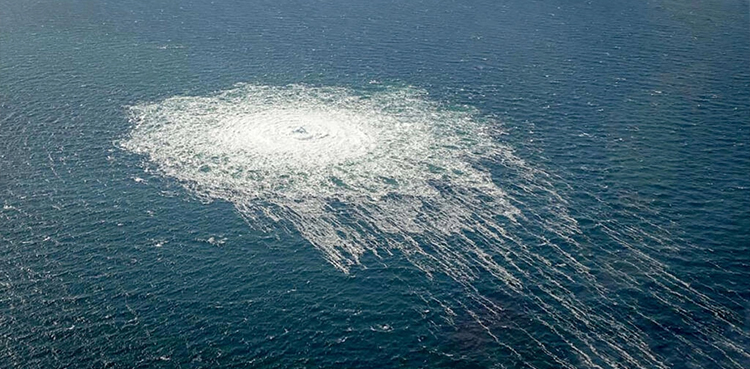
Moscow questioned Wednesday whether Washington caused mystery undersea gas pipeline leaks in Europe, that have been blamed on sabotage, which US officials bluntly called ridiculous as Russia opened a “terrorism” probe.
The three outflows from the Russia-Germany Nord Stream 1 and 2 pipelines have sent natural gas prices soaring, exacerbating an energy crunch in Europe as it stands on the threshold of winter also fanning geopolitical tensions.
Swedish intelligence announced it was opening an investigation into the massive leaks in the Baltic Sea, branding them “aggravated sabotage,” hours after the EU called the damage a “deliberate act”.
Russia’s FSB security service said it had launched an “international terrorism” investigation, the Russian prosecutor’s office announced, citing “intentional actions” to damage the pipelines.
Amid the claims and counter claims, the UN Security Council said it will meet Friday — at Russia’s request — to discuss the leaks.
“As the current Security Council president France has informed us today that Russia has requested a meeting about the Nord Stream leaks and this meeting is being planned for Friday,” Sweden’s Foreign Minister Ann Linde told a press conference.
Russian representative Dmitry Polyanskiy said the meeting would take place at 3 pm (1900 GMT) at UN headquarters in New York.
The question of who is responsible has prompted high-level finger-pointing, with Moscow charging the United States had already said Nord Stream 2 was “finished” if Russia invaded Ukraine.
President Joe “Biden is obliged to answer the question of whether the US carried out its threat,” foreign ministry spokeswoman Maria Zakharova said on social media.
Washington dismissed the suggestion, with a spokeswoman for the National Security Council saying: “We all know Russia has a long history of spreading disinformation and is doing it again here.”
Among Western allies, suspicion for the leaks has focused on Russia, which has cut gas supplies to Europe in retaliation for severe Western sanctions over the war in Ukraine.
They “are not a coincidence”, EU foreign policy chief Josep Borrell stated. “All available information indicates those leaks are the result of a deliberate act.”
He warned: “Any deliberate disruption of European energy infrastructure is utterly unacceptable and will be met with a robust and united response.”
EU chiefs Ursula von der Leyen and Charles Michel have also blamed the Nord Stream leaks on sabotage, as have leaders of several European countries.
‘Increased vigilance’
Michel tweeted that they “appear to be an attempt to further destabilise energy supply to EU”.
He added: “Those responsible will be held fully accountable and made to pay.”
The EU is currently mulling further sanctions on Russia for annexation votes imposed on four regions in Ukraine that Moscow’s forces occupy.
Neither of the Nord Stream pipelines are currently operational, but they were filled with gas when they were hit with what Swedish seismologists said were “massive releases of energy”.
One of the seismologists told AFP “there isn’t much else than a blast that could cause it”.
Denmark said meanwhile more than half of the gas in the Nord Stream pipelines had leaked into the atmosphere, adding the rest would likely escape by Sunday as Defence Minister Morten Bodskov said the pressure from the leak meant it would be “one or two weeks” before inspections of the damaged structures could begin.
Two Danish military vessels have been sent to the affected area.
According to climate groups, Nord Stream 1 and 2 contained some 350,000 tonnes of natural gas — methane and Greenpeace estimates the leaks could have the effect of releasing almost 30 million tonnes of CO2, or more than two-thirds of Denmark’s annual emissions.
Following Europe’s sabotage allegations, fossil fuel-rich Norway — which has overtaken Russia as the biggest supplier of gas to Europe — boosted security at its oil and installations in response.
“The government has decided to put measures in place to increase security at infrastructure sites, land terminals and platforms on the Norwegian continental shelf,” Norwegian Energy Minister Terje Aasland said.
The Norwegian Petroleum Safety Authority earlier this week called for “increased vigilance from all operators and shipping companies on the continental shelf”.
Built in parallel to the Nord Stream 1 pipeline, Nord Stream 2 was intended to double the capacity for Russian gas imports to Germany.
But Berlin blocked newly completed Nord Stream 2 in the days before the war.
Germany, which has been highly dependent on imports of fossil fuels from Russia to meet its energy needs, has since come under acute stress as Moscow’s supplies dwindle.



0 Comments